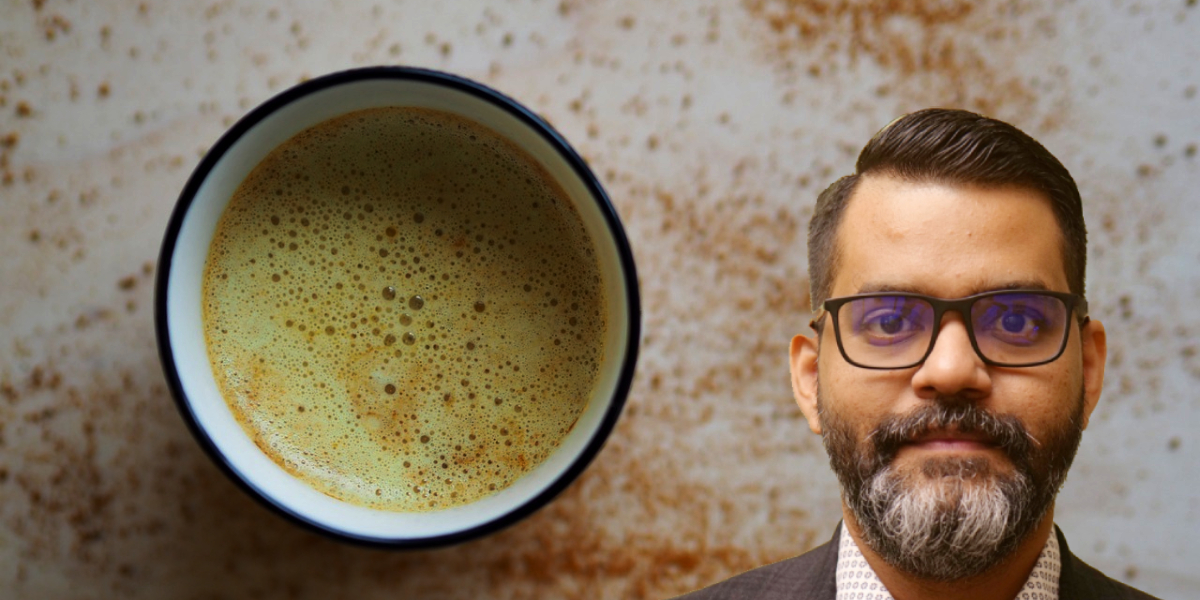Turmeric contains curcumin, a compound that Ayurvedic practitioners believe is an anti-inflammatory and antioxidant that can boost the immune system.

Dr Abby Philips says that the clinical benefits of turmeric are not convincingly proven, despite its many touted anti-inflammatory, antioxidant, and anti-cancer properties. (Creative Commons)
Turmeric milk, also known as golden milk, is a traditional Ayurvedic remedy that has been used for centuries to treat a variety of ailments, including coughs and colds.
Turmeric contains a compound called curcumin, which Ayurvedic practitioners believe has anti-inflammatory and antioxidant properties that may help boost the immune system and reduce inflammation in the body.
However, one expert questions the logic of using turmeric milk or any kind of alternative medicine or home remedies for the treatment of cold and cough.
In a conversation with South First, Hepatologist and Clinician-Scientist Dr Cyriac Abby Philips, who is popularly known as TheLiverDoc on Twitter, argued that turmeric has no role in treating patients and it could be potentially toxic.
Dr Philips said that coughs and colds are self-limiting infections.
“There is a saying that if you treat a cold, it will go away in seven days, but even without treatment, it typically resolves within a week. Therefore, these illnesses are self-limiting, meaning they usually do not require extensive medical intervention beyond managing symptoms,” says Dr Philips.
He said that the issue lies in the fact that individuals are often uncertain about the options available for managing their symptoms, not realising that the condition will ultimately resolve on its own within a few days or a week’s time.
“So that is when they try all these natural therapies (such as drinking milk mixed with turmeric), thinking that they are actually safe,” he says.
Many people are under the misconception that consuming turmeric, either directly or in milk or water, is beneficial for their health. However, less than two percent of turmeric is actually absorbed by the body and the component curcumin is negligibly absorbed, Dr Philips says.

Turmeric contains curcumin, which is believed to have anti-inflammatory and antioxidant properties. (Creative Commons)
“Therefore, there is no point in consuming turmeric in this way because it does not get absorbed,” he adds.
He says that the clinical benefits of turmeric are not convincingly proven, despite its many touted anti-inflammatory, antioxidant, and anti-cancer properties. Although there are numerous small-scale studies on turmeric, there is no concrete evidence that it provides any significant health benefits.
Even consuming turmeric in larger doses during an illness is not recommended, as it could be potentially toxic and could cause liver injury.
“In fact, the Italian government has banned turmeric supplements for medicinal use due to the high incidence of turmeric-induced hepatitis in the population,” informs Dr Philips.
Then what about adding turmeric to food? Dr Philips says that cooking turmeric with food reduces or destroys many of its bioactive components and toxic agents, making it safe for consumption.
Dr Philips reiterates that while coughs and colds alone are self-limiting and don’t often require more than some much-needed R&R (rest and recuperation), a fever that could accompany either requires a bit of attention.
 Dr Philips states that paracetamol is one of the most criticised medicines worldwide, but when taken according to the recommended dosage and duration, it is actually the safest medicine for fever. There is no need to take paracetamol as a course because it is usually taken as needed and in the recommended dosage.
Dr Philips states that paracetamol is one of the most criticised medicines worldwide, but when taken according to the recommended dosage and duration, it is actually the safest medicine for fever. There is no need to take paracetamol as a course because it is usually taken as needed and in the recommended dosage.
He explains with an example, “In the case of my patients with liver disease, I cannot exceed a maximum of two grams of paracetamol per day for up to three days. I can safely give them two grams per day for three days, and if they require more doses, I would divide the doses across several days to ensure their safety.”
He adds, “With paracetamol, we know its mechanism of action, side-effect profile, and safe and unsafe dosages. This makes it easier for healthcare professionals to prescribe and for patients to understand. When prescribing something that we are familiar with, it is easier for us to warn our patients about any potential risks and avoid harm.”
The principle of “first, do no harm” is an essential aspect of modern medicine, states Dr Philips. He claims that it is not present in alternative medicine, which lacks scientific evidence-based medical management for acute or chronic conditions.
Therefore, it is crucial to opt for evidence-based medicine for the management of any disease, he says.
Answering our question, Dr Philips says that the aspect of trust is different from the aspect of evidence. It’s similar to religion, he states.
He explains, “I believe in God, but if someone asked me to show them God, I cannot. I can say that God is within me, within that lamppost, within that table, within the chair. I can describe it in many ways, but I cannot physically show it. This is the same with the trust in turmeric.”
He adds that if he asks someone if they trust turmeric and how it works, how long it takes to work, and what dosage is required for symptom-reduction, they would not be able to provide answers. “This is the problem with ‘believing’ in something,” says Dr Philips.
Belief is different from actual evidence. “We should share our beliefs about healthcare with the evidence. So, what we should do is rely on evidence-based medicine and not just believe in something without proper scientific research,” concludes Dr Philips.

May 20, 2024

May 20, 2024

May 20, 2024

May 19, 2024

May 18, 2024

May 17, 2024